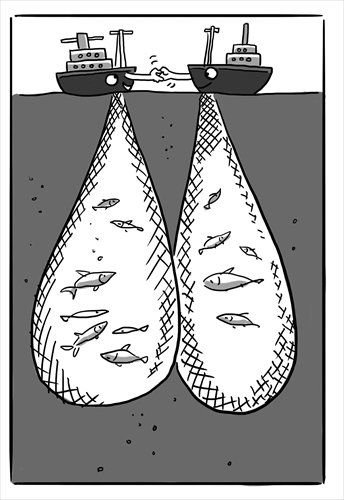HOME >> OP-ED
Fishing cooperation can build Pacific trust
By Ding Gang Source:Global Times Published: 2016/6/23 0:08:00

Illustration: Liu Rui /GT
At a forum on Sino-US relations organized by the Global Times last week, the South China Sea situation undoubtedly became the center of the topics. Many scholars expressed worries that the currently escalating tension will evolve into a military clash.Some Chinese experts believed that both China and the US need to exercise restraint to ease tensions. The US military, in particular, should not send its aircraft carriers to flex its muscles because today's China will not be deterred by US strength. If the US insists on doing so, it may drag its allies into a more dangerous scenario.
At the forum, I once again talked about fishery cooperation between China and more countries. Another way to ease tensions is to shift the focus from military confrontation and eye wider regional cooperation. This can be the best approach to strike back at the US hard-line stance.
There have been many incidents this year in which China's fishing boats were detained or expelled by Japan, South Korea, the Philippines, Vietnam and Indonesia. A few days ago, several Indonesian navy ships opened fire on Chinese fishing vessels and injured a Chinese fisherman.
The Chinese fishing vessels are often accused of operating within the exclusive economic zones (EEZs) of these countries. This shows that these countries are enhancing controls over their EEZs. As disputes in the fishing industry grow, the public increasingly demands their government protect their own waters.
In most cases when Chinese fishing boats were detained or expelled, it was not simply targeted at China. Such cases should not be over-interpreted. To celebrate National Day last year, the Indonesian government blew up and sank a total of 38 local and foreign ships that were earlier caught for fishing illegally. The Philippines also detained Vietnamese fishing boats not long ago.
Fishery conflicts have become an issue that Asian coastal countries need to face and solve. The problems cannot be thoroughly solved due to maritime demarcation. We can set EEZs in the ocean, but fish do not recognize them. Fishermen go where the fish are.
Another two factors need to be taken into consideration. The trade in fish products between Asia and the globe has been integrating and forming a huge market. In China, people can eat fish caught by Vietnamese fishermen. In Thailand, people can buy fish caught by Chinese fishermen.
Meanwhile, as global fish stocks have plummeted, fishing boats are being forced to go further even as they catch less fish despite improved technologies. Over-fishing is rampant and traditional fishing grounds are exhausted. According to research by Chen Qinghong from the China Institutes of Contemporary International Relations, fish caught in Southeast Asia make up 17 percent of the global figure. Six countries within ASEAN, namely Indonesia, Myanmar, Malaysia, the Philippines, Thailand and Vietnam are listed among the global top 20 fishing powers.
The resolution of fishing conflicts not only concerns sovereignty, but also the survival of fish, maritime protection and the sustainable development of fisheries. This can only be achieved through consultation and cooperation.
Since China and ASEAN signed the Declaration on the Conduct of Parties in the South China Sea in 2002, both sides have made certain efforts in fishery cooperation, but with limited progress. Bilateral coordination mechanisms sometimes function, but multilateral mechanisms are absent or incomplete. All parties concerned should seek to set up a multilateral mechanism for maritime governance.
The key to a breakthrough would be starting a periodic fishery coordination mechanism under the framework of Regional Comprehensive Economic Partnership (RCEP), the Asian-style Trans-Pacific Partnership.
One advantage of such a scheme is to weaken the sense of distrust caused by territorial disputes in the South and East China Seas. It can also serve as an external driving force for the current RCEP negotiations.
The author is a senior editor with People's Daily, and currently a senior fellow with the Chongyang Institute for Financial Studies at Renmin University of China. dinggang@globaltimes.com.cn Follow him on Twitter at @dinggangchina
Posted in: Ding Gang